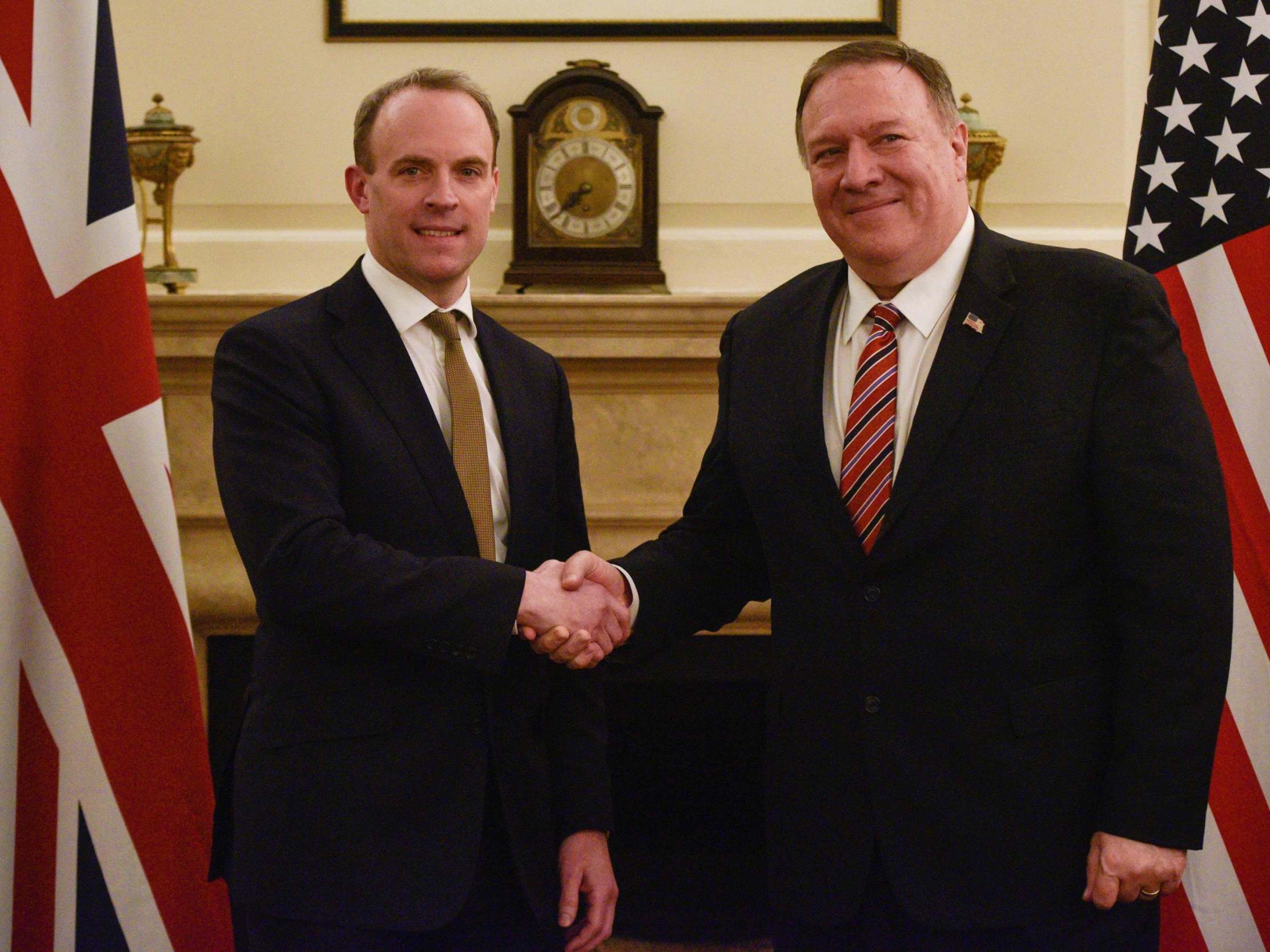Cracks appear in Britain’s special relationship with the US
Mike Pompeo’s meeting with Dominic Raab highlighted the differing positions of the two nations on a range of issues, writes Kim Sengupta


Mike Pompeo’s appearance alongside Dominic Raab at an event in London was meant to show solidarity between Britain and America. Instead, it highlighted the very pronounced and public cracks in the “special relationship” on a number of key issues.
Washington has repeatedly warned that intelligence-sharing with London will be jeopardised if the Chinese company Huawei has access to the UK’s 5G mobile network. Intense and sustained lobbying by the US administration failed to prevent the UK government continuing to allow it, however.
Pompeo said there will be work between the two countries to “get this right”, but he also reiterated the American position that having the Chinese multinational in the network is “very difficult to mitigate”.
For good measure, the US secretary of state emphasised that the insertion of the company means that Beijing does not just have a “technical back door, they have the front door” into the communications infrastructure. Reasserting Washington’s position, he said: “We will never permit US national security information to go across networks we don’t have confidence in.”
The UK’s decision on Huawei will resonate internationally. A number of states, including Nato countries, are in the process of deciding whether to let the tech giant into their network. The European Union, which defied US pressure by rejecting an outright ban, has published a “toolbox” of security measures. Huawei was quick to welcome Brussels’ stance, praising a “non-biased and fact-based approach towards 5G security”.
“Every country will make its own sovereign decision, just like the UK did,’’ acknowledged Pompeo at the meeting in London organised by the think tank Policy Exchange.
Nevertheless, the US had expected support from Britain, of all countries, on the issue, as the irate statements of a number of Republicans in Congress highlighted. The theme of many was that the Huawei decision amounted to betrayal. After all, the relationship was supposed to blossom with Brexit and following the arrival of Boris Johnson in Downing Street.
The British foreign secretary pointed out that there have been past differences within the “special relationship”, such as between Churchill and Roosevelt, or between Thatcher and Reagan. Differences on so many issues, however, were unexpected so soon into what should have been a honeymoon period.
Huawei is not the only ongoing dispute. There is also Washington’s refusal to extradite Anne Sacoolas, who is allegedly responsible for the death of the teenager Harry Dunn in a road crash last year; the UK’s insistence on levying a tax on US tech multinationals despite American threats to retaliate with taxes on British imports; and the UK’s resistance to American pressure in standing by the Iran nuclear agreement.
Pompeo offered no encouragement over the Sacoolas extradition case. The only thing he and Raab agreed on, in answer to a journalist’s question, was that there would be no “Checkpoint Charlie” exchange of Sacoolas for Prince Andrew, who is allegedly wanted for questioning by the FBI over Jeffrey Epstein’s crimes.
There is no change on Iran. The UK will not abandon the agreement and join Trump in imposing more punitive sanctions. Downing Street will also continue to work with France and Germany on a mechanism aiming to enable international companies to trade with the country.
The falling out has caused surprise in some quarters, especially as there was supposed to be a personal factor buttressing the “special relationship” – a supposed tendresse between Donald Trump and Boris Johnson.
It is worth remembering, however, that while Johnson was mayor of London he declared that “the only reason I wouldn’t go to some parts of New York is the real risk of meeting Donald Trump”.
Johnson was responding then to Trump’s claim that parts of London had become so radicalised by Muslims “that police were afraid for their own lives”. The mayor declared: “Donald Trump’s ill-informed comments are complete and utter nonsense.”
That was before Trump became president, and before Brexit and the need for a US trade deal. Johnson has been careful not to criticise Trump publicly since then. His failure to defend the UK ambassador to Washington, Kim Darroch, when Trump gratuitously insulted the envoy, was shocking.
It may be the case that with its huge parliamentary majority, Boris Johnson’s government will stand up more to the US, especially as there is little chance of a trade deal this side of the US presidential election.
At the same time, members of the Trump administration are likely to be distracted by other pressing worries.
Pompeo’s next stop is Ukraine and a meeting with its president, Volodymyr Zelensky. He will be the first senior US official to visit since impeachment proceedings began against Trump. The US president is charged with obstructing Congress and withholding military aid to Ukraine in an attempt to force Kiev to investigate Hunter Biden, son of the former vice president who could be Trump’s Democratic rival in the election.
The US secretary of state said he would discuss the issue of corruption in Ukraine, but he refused to say whether he would bring up the Biden issue.
Pompeo himself has allegations hanging over him on Ukraine. He was involved in a highly publicised spat at the weekend after a journalist asked him about his failure to defend the former US ambassador to Ukraine, Marie Yovanovitch, who was removed from her post following false allegations made against her by Trump’s personal attorney, Rudy Giuliani.
More revelations are likely to emerge about Pompeo’s role in the Ukraine affair if John Bolton, the president’s former national security adviser, is allowed to testify at the impeachment hearing. The London visit could turn out to be a relatively calm interlude as storm clouds gather ahead.
Join our commenting forum
Join thought-provoking conversations, follow other Independent readers and see their replies
Comments